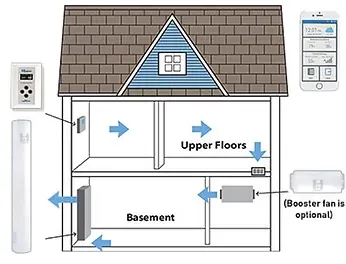
Air Quality Systems
Air quality systems in basements offer several benefits to improve the overall indoor environment and health of occupants:
Mold Prevention: Proper ventilation and air quality systems help control humidity levels, reducing the risk of mold growth. Mold can thrive in damp environments, and addressing this issue contributes to a healthier living space.
Odor Elimination: Basements can sometimes develop musty or stale odors due to poor ventilation. Air quality systems help circulate fresh air, eliminating unpleasant smells and creating a more pleasant living environment.
Allergen Reduction: Effective air filtration systems can capture and remove common allergens like dust, pollen, and pet dander. This is particularly important for individuals with allergies or respiratory conditions.
Radon Mitigation: Basements are susceptible to radon gas, which can pose health risks. Air quality systems equipped with radon mitigation features can help reduce radon levels, ensuring a safer indoor environment.
Moisture Control: Air quality systems, including dehumidifiers, help control moisture levels in basements. This is crucial for preventing water damage, mold growth, and the proliferation of dust mites.
Improved Comfort: Proper ventilation and air circulation contribute to a more comfortable and enjoyable basement space. This is especially important if the basement is used for living, working, or recreational purposes.
Health Benefits: By maintaining a clean and well-ventilated basement, air quality systems contribute to the overall health and well-being of occupants. Good indoor air quality is associated with better respiratory health and a reduced risk of related illnesses.
Preservation of Belongings: Controlling humidity levels helps protect items stored in the basement, such as furniture, clothing, and documents, from moisture-related damage such as warping, mold, or mildew.
In summary, air quality systems in basements provide a holistic approach to creating a healthier, more comfortable, and safer indoor environment by addressing issues related to moisture, mold, allergens, and other pollutants
BOOK US ONLINE

Customer Feedback
Our clients consistently rate Central Drains Waterproofing projects a perfect 10/10, with a 100% satisfaction rate. We pride ourselves on delivering exceptional quality and unmatched customer service, ensuring every detail meets our clients’ expectations. Our team goes above and beyond, so every project is a success story, and every client feels secure and satisfied with their investment in waterproofing.


10/10
Job
RATINGS

100%
Client
Satisfaction
CLEVELAND / AKRON / CANTON / TOLEDO / FINDLAY
Call 440-493-9390
Site: www.centraldrains.online

